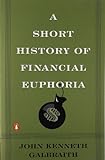The major popular currencies are very sticky and very difficult to stop believing in them.
Whatever you might think about the US declining compared to China and other issues, there's still a $21T economy with the economic activity of 330M people behind it.
And if you're doing business in this country the US government will demand that you pay your taxes in USD. There's a lot more inertia in the USD than people into crypto give it credit for. Everyone in the country could, in theory, wake up tomorrow and all decide to use something different, but in reality that won't happen.
Crypto can (and most likely will) crash hard and while its getting big enough now that the damage will likely ripple through the economy a bit, but the US economy will go on.
And I'd strongly recommend Galbraith:
https://www.amazon.com/Money-Whence-Came-Where-Went/dp/06911... https://www.amazon.com/History-Financial-Euphoria-Penguin-Bu... https://www.amazon.com/Great-Crash-1929-Kenneth-Galbraith/dp...
Off the top of my head, I would add:
* "The Way to Wealth," by Benjamin Franklin: https://www.amazon.com/dp/0918222885 (also available online for free; it's in the public domain) -- no-nonsense practical advice from a super-successful individual
* Warren Buffett's Letters to Berkshire Hathaway shareholders: http://www.berkshirehathaway.com/letters/letters.html (also available organized by topic, in a bound book: https://www.amazon.com/dp/1611637589 which some will find much easier to read)
* "The Intelligent Investor," by Benjamin Graham (specifically the chapters titled "The Investor and Market Fluctuations" and "Margin of Safety"): https://www.amazon.com/dp/0060555661
* "Influence: the Psychology of Persuasion," by Robert Cialdini: http://www.amazon.com/exec/obidos/ASIN/0688128165
Also:
* "Devil Take the Hindmost," by Edward Chancellor: https://www.amazon.com/dp/0452281806
* "A Short History of Financial Euphoria," by John Kenneth Galbraith: https://www.amazon.com/dp/0140238565
* "Extraordinary Popular Delusions and the Madness of Crowds," by Charles Mackay: http://www.amazon.com/exec/obidos/ASIN/1586635581


Here's one of my favorite passages from the book:
> There are those who are persuaded that some new price-enhancing circumstance is in control, and they expect the market to stay up and go up, perhaps indefinitely. It is adjusting to a new situation, a new world of greatly, even infinitely increasing returns and resulting values. Then there are those, superficially more astute and generally fewer in number, who perceive or believe themselves to perceive the speculative mood of the moment. They are in to ride the upward wave; their particular genius, they are convinced, will allow them to get out before the speculation runs its course. They will get the maximum reward from the increase as it continues; they will be out before the eventual fall.
> For built into this situation is the eventual and inevitable fall. Built in also is the circumstance that it cannot come gently or gradually. When it comes, it bears the grim face of disaster. That is because both of the groups of participants in the speculative situation are programmed for sudden efforts at escape. Something, it matters little what -- although it will always be much debated -- triggers the ultimate reversal. Those who had been riding the upward wave decide now is the time to get out. Those who thought the increase would be forever find their illusion destroyed abruptly, and they, also, respond to the newly revealed reality by selling or trying to sell. Thus the collapse. And thus the rule, supported by the experience of centuries: the speculative episode always ends not with a whimper but with a bang. There will be occasion to see the operation of this rule frequently repeated.
> Although only a few observers have noted the vested interest in error that accompanies speculative euphoria, it is, nonetheless, an extremely plausible phenomenon. Those involved with the speculation are experiencing an increase in wealth -- getting rich or being further enriched. No one wishes to believe that this is fortuitous or undeserved; all wish to think that it is the result of their own superior insight or intuition. The very increase in values thus captures the thoughts and minds of those being rewarded. Speculation buys up, in a very practical way, the intelligence of those involved.
> This is particularly true of the first group noted above -- those who are convinced that values are going up permanently and indefinitely. But the errors of vanity of those who think they will beat the speculative game are also thus reinforced. As long as they are in, they have a strong pecuniary commitment to belief in the unique personal intelligence that tells them there will be yet more. In the last century, one of the most astute observers of the euphoric episodes common to those years was Walter Bagehot, financial writer and early editor of The Economist. To him we are indebted for the observation that "all people are most credulous when they are most happy."
Jeremy Grantham, the author of the OP, is the kind of person who never, ever wants to be in the first nor the second group.
--
[a] https://www.amazon.com/History-Financial-Euphoria-Penguin-Bu...